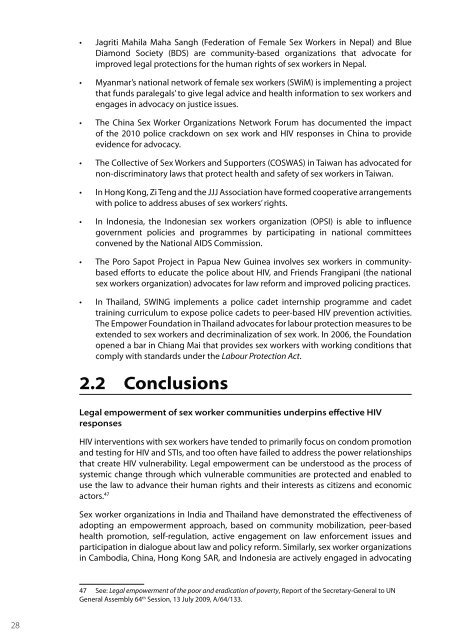SEX WORK AND THE LAW - HIV/AIDS Data Hub
SEX WORK AND THE LAW - HIV/AIDS Data Hub
SEX WORK AND THE LAW - HIV/AIDS Data Hub
Create successful ePaper yourself
Turn your PDF publications into a flip-book with our unique Google optimized e-Paper software.
Jagriti Mahila Maha Sangh (Federation of Female Sex Workers in Nepal) and Blue<br />
Diamond Society (BDS) are community-based organizations that advocate for<br />
improved legal protections for the human rights of sex workers in Nepal.<br />
Myanmar’s national network of female sex workers (SWiM) is implementing a project<br />
that funds paralegals’ to give legal advice and health information to sex workers and<br />
engages in advocacy on justice issues.<br />
The China Sex Worker Organizations Network Forum has documented the impact<br />
of the 2010 police crackdown on sex work and <strong>HIV</strong> responses in China to provide<br />
evidence for advocacy.<br />
The Collective of Sex Workers and Supporters (COSWAS) in Taiwan has advocated for<br />
non-discriminatory laws that protect health and safety of sex workers in Taiwan.<br />
In Hong Kong, Zi Teng and the JJJ Association have formed cooperative arrangements<br />
with police to address abuses of sex workers’ rights.<br />
In Indonesia, the Indonesian sex workers organization (OPSI) is able to influence<br />
government policies and programmes by participating in national committees<br />
convened by the National <strong>AIDS</strong> Commission.<br />
The Poro Sapot Project in Papua New Guinea involves sex workers in communitybased<br />
efforts to educate the police about <strong>HIV</strong>, and Friends Frangipani (the national<br />
sex workers organization) advocates for law reform and improved policing practices.<br />
In Thailand, SWING implements a police cadet internship programme and cadet<br />
training curriculum to expose police cadets to peer-based <strong>HIV</strong> prevention activities.<br />
The Empower Foundation in Thailand advocates for labour protection measures to be<br />
extended to sex workers and decriminalization of sex work. In 2006, the Foundation<br />
opened a bar in Chiang Mai that provides sex workers with working conditions that<br />
comply with standards under the Labour Protection Act.<br />
2.2 Conclusions<br />
Legal empowerment of sex worker communities underpins effective <strong>HIV</strong><br />
responses<br />
<strong>HIV</strong> interventions with sex workers have tended to primarily focus on condom promotion<br />
and testing for <strong>HIV</strong> and STIs, and too often have failed to address the power relationships<br />
that create <strong>HIV</strong> vulnerability. Legal empowerment can be understood as the process of<br />
systemic change through which vulnerable communities are protected and enabled to<br />
use the law to advance their human rights and their interests as citizens and economic<br />
actors. 47<br />
Sex worker organizations in India and Thailand have demonstrated the effectiveness of<br />
adopting an empowerment approach, based on community mobilization, peer-based<br />
health promotion, self-regulation, active engagement on law enforcement issues and<br />
participation in dialogue about law and policy reform. Similarly, sex worker organizations<br />
in Cambodia, China, Hong Kong SAR, and Indonesia are actively engaged in advocating<br />
47 See: Legal empowerment of the poor and eradication of poverty, Report of the Secretary-General to UN<br />
General Assembly 64 th Session, 13 July 2009, A/64/133.<br />
28
















